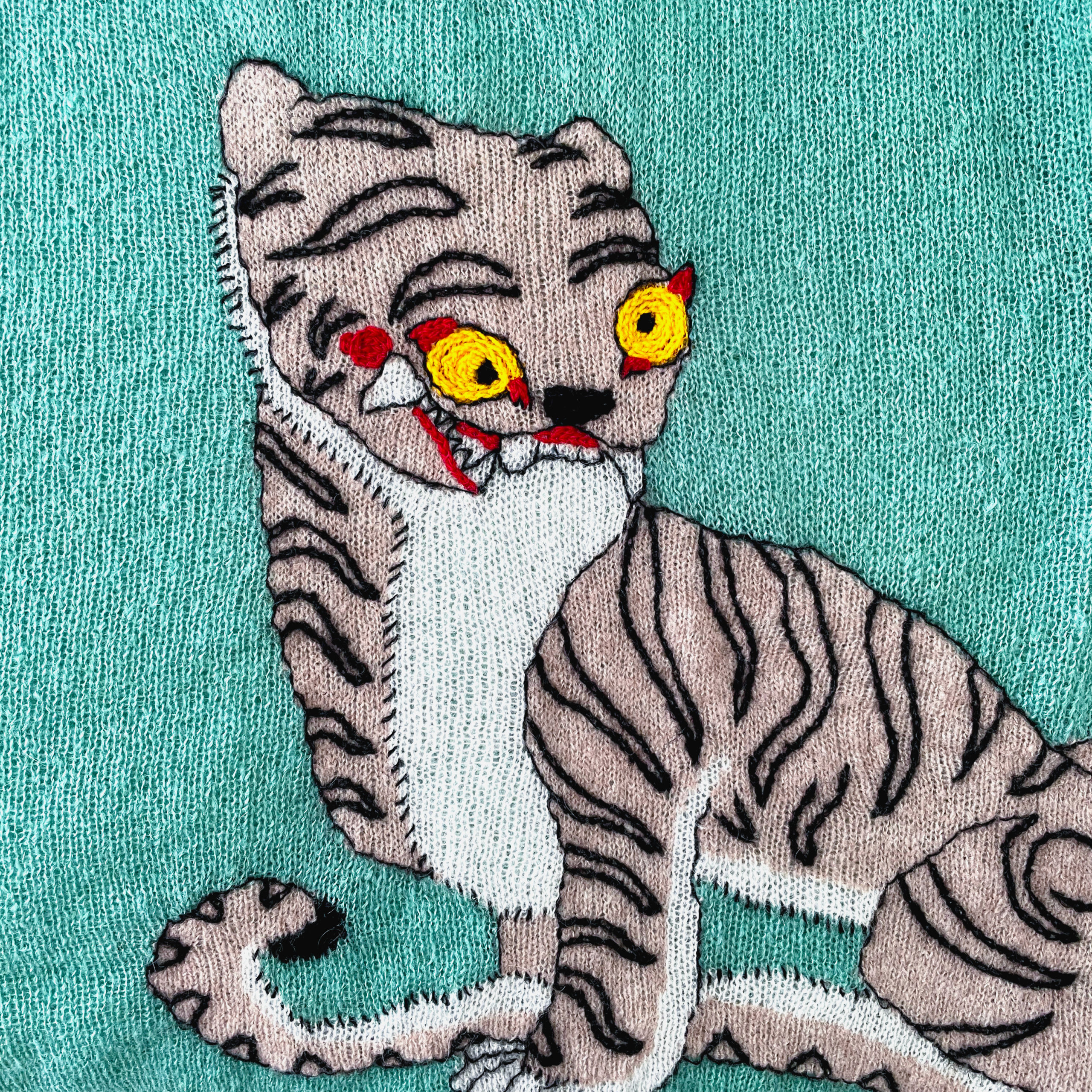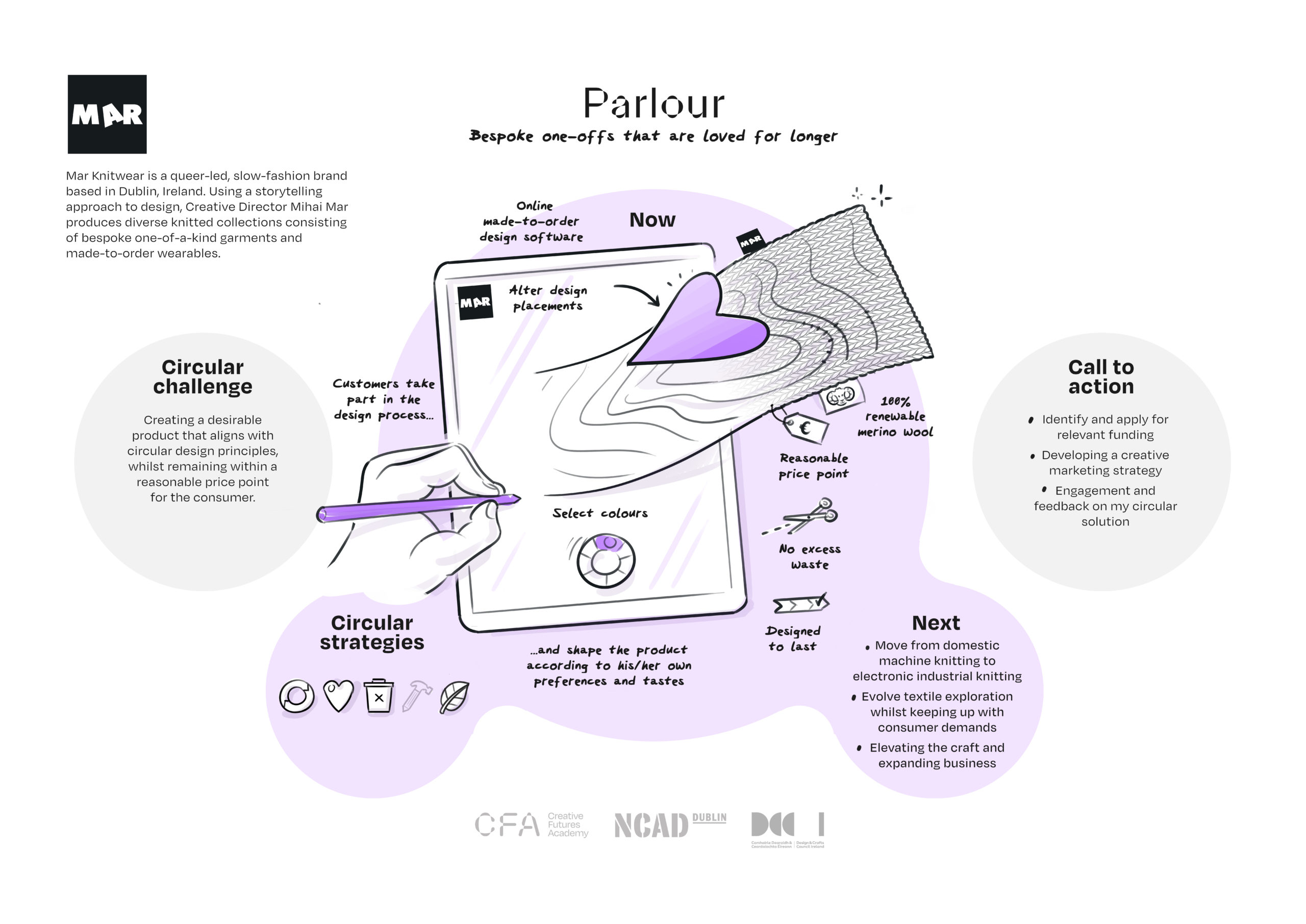Mar Knitwear
Mar Knitwear is a queer-led, slow-fashion brand based in Dublin, Ireland. Using a storytelling approach to design, Creative Director Mihai Mar produces diverse knitted collections consisting of bespoke one-of-a-kind garments and made-to-order wearables.

Parlour
The circular challenge
For the past several years, founder Mihai Mar has primarily identified as a Knitwear Artist, who is driven by the exploration of elaborate textile manipulation techniques and the capabilities of knitwear as a medium. Now, as he prepares to launch his first commercial collection, the nature of his practice is changing. Although his production methods are low-impact, and his material selection is environmentally conscious, the production process takes an excessive period of time, which drastically increases the products’ price point.
Mar Knitwear therefore identified that their main circular challenge was in creating a desirable product that aligns with circular design principles, whilst remaining within a reasonable price point for the consumer.
The circular design strategy:
- Design for Emotional Durability
- Design for Minimal Waste
- Design for Cyclability
The NOW solution: What circular solution was prototyped and what are the companies short-term circular goals?
Mar Knitwear’s circular prototype investigates emotional durability and asks the question ”how can we design clothing that entices the consumer to stay in love with their clothing for longer?”
Their circular concept, entitled ‘Parlour’, takes inspiration from a tattoo artist’s approach to design. By creating a made-to-order design software on their website, Mar Knitwear can offer customers the opportunity to take part in the design process by allowing them to select colours and alter design placements, thereby creating a personalised product.
The core idea of customization is to turn customers’ heterogeneous needs into an opportunity to create value, rather than a problem to be minimised, challenging the “one size fits all” assumption of traditional production. Co-creation is a business model that is credited with creating sustainable impact because it encourages ‘sufficiency’ and because it is strongly linked to production on demand and ‘emotional durability’. Co-creation blurs the line between designer and consumer, giving consumers the opportunity to shape the product according to his/her own preferences and tastes.
In offering an immersive experience like this, Mar Knitwear aims to create a desirable product that’s designed to last. Furthermore, by implicating a made-to-order production system to their business, Mar Knitwear avoids excess waste being produced, whilst also gaining a live and nuanced understanding of consumer tastes and demands.
From a materials perspective, all products are made of 100% natural, renewable, and biodegradable merino wool, in order to eliminate the shedding of micro-fibres and further align with circular design principles.
What were the main hurdles and lessons learnt from your prototyping phase?
One of the key hurdles that Mar Knitwear encountered whilst prototyping their circular business model, was in developing the enabling design software. Many customisation strategies fail due to poor implementation and immature digital experiences for the consumer. By collaborating with coding and web-development experts, Mar knitwear developed a bespoke co-creation platform that can be embedded into their website.
Another key hurdle was the translation of the Mar Knitwear signature and relatively complex brand-style into simplified design assets or elements that could be mixed and matched by the consumer. Mar recognised that clever limitations must be set on their design palette, so as to ensure that the end-product has a reasonable price-point, and that the consumer does not co-create outside of the brand image.
Finally, Mar engaged with their end consumer via survey during the prototyping process, to better understand the rationale behind their favourite garments. The majority of respondents indicated that their favourite garments were higher-priced bespoke garments, which they take pride in knowing no one else owned. Previously, Mihai had believed that making one-off garments was something they would need to move away from, or compromise on, when developing and launching their commercial business. However, through the prototyping and market research, they realised that this aspect of the brand is fundamental – from both a consumer engagement and circularity standpoint.
The NEXT solution: What are your bigger / longer-term circular goals for your brand?
Mar Knitewear’s long-term circular solution is to tackle the physical challenges they face as a studio, by transforming their production processes from domestic machine knitting – which can be time-consuming and tedious – to electronic industrial knitting. This will allow them to further evolve textile exploration whilst keeping up with consumer demands, therefore simultaneously elevating their craft and expanding their business.
With this technology, Mihai aims to advance the ‘Parlour’ project by achieving more complicated design outcomes, solidifying the brand’s novelty and conveying their circular objective.
Additionally, they aim to push their circular material’s sourcing strategy, by developing products from dead-stock materials and textiles waste.

Projected future impact: What is the expected positive impact - environmental, economic, social - from your longer term circular solution.
As an emerging Irish Designer, Mar Knitwear’s ambitions are to expand on Ireland’s inspiring history with knitwear by showcasing their contemporary vision of the medium. Mihai wants to stand as a designer specialised in innovative and ecological design solutions. In 5 years time they aim for all garments to be made of 100% recycled materials and to bring circular designs to market at scale.
What questions or uncertainties are you facing right now in terms of your circular development?
- Where can I source dead-stock and discarded yarns and fibres?
- How can I keep our customers excited about the evolution of circularity?
- How can I ensure that our circular design solutions operate well with our current production methods?
Call to Action:
To move from prototype to pilot, Mar Knitwear is looking for the following supports:
- Support in how to identify and apply for relevant funding, which can support the next phase of development for the brand, and allow us to invest in necessary machinery.
- Support in developing a creative marketing strategy for the brand.
- Engagement and feedback on my circular solution, future circular ambitions and quality of my product.


